
Oof. This week’s batch of songs are — well, they’re certainly songs that were on the radio in the 1980s.
#6 Billy Vera and the Beaters, ”At This Moment” (1981)
Peaked at #79 on its initial release; the 1987 re-release hit #1 Hot 100 and Adult Contemporary.
Dw. Dunphy — I’m going to get slaughtered by the hardcore Billy Vera fans out there (gotta be some of those, right?) but this is one of the most desperate, teeth-grindingly bathetic songs ever. Vera has made a decent living as a sitcom theme song singer and this track, though not recorded for a sitcom, came to power as Alex P. Keaton’s love song in Family Ties.
Matt Wardlaw — There’s at least one hardcore fan of BV, Dunphy. Watch yourself!
Jack Feerick — You’re a hardcore fan of bacterial vaginosis?
Mike Heyliger — As good as heartbroken, blue-eyed soul gets. I’ve sung this one loudly to no one in particular during many of my moments of infatuation and heartbreak, although my favorite memory of the song has to do with my friend Marshall singing it at auditions for the 6th grade talent show and killing it, revealing his singing talent to the world-or at least my middle school.
Feerick — Ah, for the days when a bar band could still get lucky.
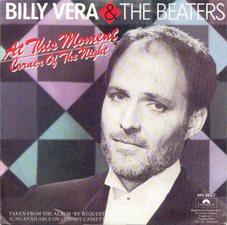 I didn’t know anything about Billy or his backstory when this song hit, and I wasn’t a Family Ties fan at all, so this was just completely out of the blue for me. As an adult I can appreciate the combination of blue-eyed soul, Motown revue horns, and C & W grit that’s going down here, but it never did much for me and still doesn’t. Sorry, guys. Sorry, Billy.
I didn’t know anything about Billy or his backstory when this song hit, and I wasn’t a Family Ties fan at all, so this was just completely out of the blue for me. As an adult I can appreciate the combination of blue-eyed soul, Motown revue horns, and C & W grit that’s going down here, but it never did much for me and still doesn’t. Sorry, guys. Sorry, Billy.
Jon Cummings — As a student of pop-chart minutiae, I was intrigued by this single’s late-blooming success, but had no use for it as a piece of music. I tend to think of it in the same breath as Bruce Willis’ awful turn on pop radio, perhaps because the two inexcusable events happened around the same time. Why does “At This Moment” appear so early in this comp, when its hit status came in ’86-’87? I’m sorry, but if you’re dealing with “When I’m With You” you put it in ’89, not ’83, amirite? (Then again, if I’m comping the ’80s, I place “Red Red Wine” in ’83 rather than ’88, and Billy Idol’s version of “Mony Mony” in ’81 rather than ’87 … because if we’ve proven anything over the last 47 years, it’s that the entire world revolves around me, Me, ME!)
Dunphy — Vera gets massive bonus points for being a Hong Kong Cavalier, but he also sang the theme song from The King Of Queens, also known as This Next Half Hour You’re Never Getting Back.
Feerick — Ahem. I think you’ll find, Dunphy, that Mr. Vera’s character Pinky Carruthers was not in fact one of the Hong Kong Cavaliers, but rather a member of Team Banzai‘s auxiliary force, the Blue Blaze Irregulars — he introduces himself to John Parker as such, remember — and thus he would have been back guarding the compound whilst the Cavaliers were out at their gig.
At least I’m pretty sure the two are happening simultaneously. I’ve seen the movie at least a dozen times, and love it as I do I still can’t tell what’s going half the time.
Dunphy — Duly noted. At least he’s not in league with John Big Booty.
Feerick — Big Boot-Á©!!!
Thierry, help me out here.
David Medsker — * has no idea what Feerick and Dunphy are talking about *
Dunphy — Sure you don’t.
Dave Lifton — As I said during the AM Gold series about “Afternoon Delight,” I don’t see why this is supposed to represent all that was awful about the 80s. Is it good? No, not at all. But it’s far too innocuous to be treated as anything more than a lame blue-eyed soul ballad that got lucky.
Rob Smith — I love this song like I love root canals; like I love prostate exams and flea infestations and Dick Cheney. I love it like I love canned beets and diarrhea and Fred Figglehorn videos, like I love nosebleeds and painful urination and basement floods. I love it like I love the taste of my own bile, like I love the taste of that little bit of regurgitated matter that encroaches into my mouth when I burp after drinking a six pack and eating hot Italian sausage. I love it like I love Pat Robertson and Scientology and Coldplay. I love it like I love children’s choirs in pop hits. Love it like I love Chris Brown’s neck tattoos, and the thought of sleeping with Kathy Bates, of romancing her and running my hands and tongue over every sweaty inch of her. I love this song like I love Mike Love. If I believed in hell and could choose one song to accompany me down the chute into the fiery lake of eternal torment—a song that would provide a fitting soundtrack to that eternity of unknowable pain—it would be this one. Yes. Yes, my love for this song is just like that.
Dan Wiencek — It’s always irked me when people carp about how 80s music sucked. Because you know what actually did suck about the 80s? The sitcoms. TV comedy in the 80s seemed determined to pretend Norman Lear never existed by showing us the most neutered, anodyne, nuclear-family-extolling fare it could without sending themselves and us into diabetic seizures. All in the Family tackled thorny issues of class, race, and generational warfare nearly every week; the 80s gave us the Very Special Episode, and here to go with it (originally released in ’81 but not a hit until five years later), the Very Special Song.
Like Family Ties, the show that spawned it, this song is feeling by formula, an engine designed to yank the emotional levers of Baby Boomers. The “heartfelt” a capella section gets more embarrassing the longer it goes on, and the arrangement on the whole, with its steel guitar and fat ’50s sax, lies somewhere between the Saturday Night Live closing theme and Sha Na Na. This song should be an Easter egg on an overlooked Family Ties DVD reissue, not still popping up on the public airwaves.
Michael Parr — What the hell is wrong with you people? Seriously, how can you live with yourselves knowing that you are diminishing the very heart and soul of one of the most endearing love stories of our generation?
Dunphy — This song is about Kim and Kanye?
#7 Quarterflash, ”Harden My Heart” (1981)
Hit #3 in the Hot 100, topped the Hot mainstream Rock chart.
Dunphy — I’ve always had a soft spot for this era of Quarterflash. Late in 2012 I had a conversation with the A&R rep that helped get the band signed to Geffen Records. She said that, even with their career-killing first band name, Seafood Mama, this song jumped off the demo and demanded a shot. My sister and I initially thought this was a new Pat Benatar single but, in hindsight, this sounds nothing like Benatar.
The album itself isn’t bad either, although it is much milder than the new wave-ish songs people recognize from it. What I liked most was that this was a band effort; not just a bunch of guys backing up the female lead singer.
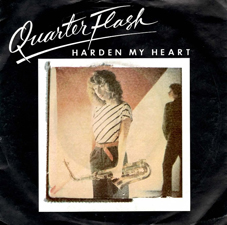 Wiencek — As Dunphy intimated, I’m sure more than one person bought this back in the day thinking it was Pat Benatar. (Speaking of, where is ol’ Pat? How can we have an ’80s party without her?) Anyway, I always liked this one. It’s got a driving rhythm but an understated vibe, along with a little touch of the melancholy. And of all the memorable sax breaks the ’80s gave us, this is one of the best.
Wiencek — As Dunphy intimated, I’m sure more than one person bought this back in the day thinking it was Pat Benatar. (Speaking of, where is ol’ Pat? How can we have an ’80s party without her?) Anyway, I always liked this one. It’s got a driving rhythm but an understated vibe, along with a little touch of the melancholy. And of all the memorable sax breaks the ’80s gave us, this is one of the best.
* nervously scans remaining songs for “Careless Whisper” *
Cummings — I used to think this song was awesome, and have a 45 of it somewhere … but last week I caught the instrumental bridge on XM’s ’80s channel and didn’t recognize it. But what the hey — Quarterflash were a damn sight better than the Motels.
Brian Boone — All you east coast and Ohio ‘dosers are always getting to talk about your local sensation and local bands that made good. Well, I’m from Portland, and Quarterflash was the biggest rock band to ever come out of Portland. At least after the Kingsmen and before Everclear. They were absolutely huge in the ’80s. Like, NU SHOOZ huge (who were also from Portland, so I’ve contradicted myself already).
It was 1981, so I was extremely young, but I remember Quarterflashmania and how it engulfed the I-5 corridor as far north as Vancouver, Washington, and as far south as Eugene. Formed by the merger (because that was a popular thing in the ’80s) of two other, popular local bands, they had two specials that aired on local TV and played at every radio-sponsored concert, food festival, and waterfront celebration well into the ’90s to huge crowds, a good run built primarily on this saxy little bitch.
I also like that it was used in Wet Hot American Summer as the most 1981-ish song they could find.
Smith — Ah, Rindy Ross — splendid slow-burn rock chick voice, and sax riff queen to boot. Is it better to have a long career, with the occasional middling hit, or to hit the ball out of the damned park your first time out and fade slowly from view thereafter? I know there were a couple other, smaller hits, but we’re still talking about this one, 30-plus years later.
Lifton — I never thought much of this one at the time. Listening again, I still don’t think it’s that great a song, but I like the wordless background vocals – which there aren’t enough of, and the compressed, phased guitars. Already the Rockman was starting to work its way towards becoming the dominant sound of electric guitar of the decade.
Feerick — Damn, I miss saxophones in rock n’ roll. For a while in the 80s, everybody had one; Men At Work, of course, but even bands like Duran Duran, Dire Straits and Pink Floyd had sax guys who toured with them, who would blow on like two songs a set and bang a tambourine for the rest of the night. That must’ve been a sweet gig.
Anyway. What personality Quarterflash had came disproportionately from Rindy Ross, not just as their defining instrumental voice but as their lead singer. And like most folks who are called upon to multi-task, she does not do both jobs equally well. As singers go, she’s a great sax player. She sounds wounded and vulnerable here, which is okay as far as it goes, but this is a kiss-off song; and when the lyric calls for bravado, she’s just too tentative. She’s not bad, and she’s certainly working hard — you can hear her working hard — but she’s not totally selling the anger. If anything, she sounds like she’s pleading for him to take her back, which puts the whole thing in cognitive dissonance territory.
Still, even though it’s not perfect, it’s very, very good, and I’ll call this my pick of the week.
Heyliger — Certainly one of the best completely anonymous songs of the ’80s.
#8 .38 Special, ”Hold On Loosely” (1981)
Hit #3 Hot Mainstream Rock, #27 in the Hot 100
Smith — Indispensable AOR/Southern rock. They had something their Southern-by-the-grace-of-God contemporaries Molly Hatchet and Blackfoot didn’t have — Jim Peterik’s phone number. Without Peterik’s radio-rock sensibilities, Don Barnes and Jeff Carlisi and Donnie Van Zant and their five or six drummers would’ve languished in Opening Act Land, as they had before Peterik handed them “Rockin’ into the Night” on a silver platter the year before this one came out. But this is just a great song, one still worth cranking when you’re taking the Trans Am out for a spin.
Cummings — I was crazy for .38 Special’s singles as a high schooler. They were my birthright, as a pop-fueled Southern boy. “Rockin’ Into the Night” was absolutely killer, and “Hold On Loosely” was an invincible follow-up to that song.
Wiencek — I always wanted to mash up this song and “Caught Up in You” and see if anyone noticed they’re ostensibly two different songs. (See also “Private Eyes” and “Kiss on My List.”) Harmless bar-band fare, produced to a high sheen until there’s barely any rock and roll left to speak of.
Cummings — Dan, “Private Eyes” and “Kiss on My List” do NOT sound alike. The mere notion that they do offends me. Of course, I say that because, speaking as a huge H2O fan for 35 years now, “Private Eyes” is one of my least favorite of their songs, and “KoML” is perhaps my very fave. So if they’re alike, my whole life is a lie.
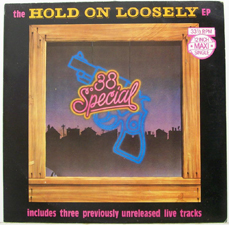 Feerick — It’s all about Jon Cummings, folks.
Feerick — It’s all about Jon Cummings, folks.
Lifton — It’s a competent, if unspectacular, track that probably nobody other than Wardlaw would have given a crap about if not for the fact that the rock world was still reeling from the loss of Lynyrd Skynyrd. Donnie Van Zant really isn’t that good a singer. There’s not a whole lot of personality in his voice, especially not compared with his big brother. But songs like this are what AOR was made for.
Feerick — By this point in the band’s career, Donnie Van Zant wasn’t even singing much. It had pretty much become Don Barnes’s band, with Van Zant acting as basically a hype man.
Otherwise, you’re spot-on. It’s fast-food music. Filling, competently-made, carefully crafted, utterly boring. There’s nothing distinctive or idiosyncratic about this, and certainly nothing identifiably ”Southern” by this point. I suppose .38 Special must be somebody’s favorite band, but I can’t imagine it. I won’t turn it off if I hear it on the radio, but it’s always just a placeholder until the next song. .38 Special: They’ll do until something better comes along.
There’s no way this song really needed three guitar players and two drummers, though.
Heyliger — One of the catchiest completely anonymous songs of the ’80s.
#9 Joey Scarbury, ”Theme to The Greatest American Hero (Believe It or Not)” (1981)
Reached #2 in the Hot 100.
[youtube id=”pUEFHZFLAyM” width=”600″ height=”350″]
(live on Solid Gold!)
Boone — This is the last song sung by a middle-aged man with a beard to top the charts. (That is probably true.) This guy looks just like my dad. Hell, he looked like all of our dads. He might be some of our dads. Nevertheless, I love this silly song from TV, if only for its unexpected, totally inappropriate bitchin’ guitar solo.
Smith — Dentist pop. Cardigan-wearing schmaltz. Oh, and I own this album (the fucking ALBUM) on vinyl, because I was 11 and The Greatest American Hero was one of my favorite shows.
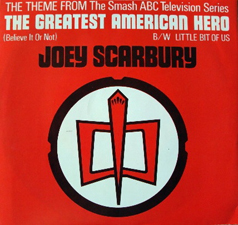 Dunphy — I think I already spoke about how we had to sing this for music class when I was in elementary school. That accounts for two times a week, every week, for about three months. Good song, bad song, if you have to experience it that way for so long, it will scar you. (Scarbury indeed, heh.) This song is a weak, AC schlump that had the fortune of being attached to the Stephen J. Cannell machinery. It is not a totally crappy song, but I don’t think anyone wakes up in the morning saying, “Man, do I want to listen to the theme from Greatest American Hero today!”
Dunphy — I think I already spoke about how we had to sing this for music class when I was in elementary school. That accounts for two times a week, every week, for about three months. Good song, bad song, if you have to experience it that way for so long, it will scar you. (Scarbury indeed, heh.) This song is a weak, AC schlump that had the fortune of being attached to the Stephen J. Cannell machinery. It is not a totally crappy song, but I don’t think anyone wakes up in the morning saying, “Man, do I want to listen to the theme from Greatest American Hero today!”
No Wardlaw jokes, people. I’m sure he feels exactly the same way.
It could be much worse though. A year before this I was in parochial school and, at the end of EVERY day, they’d pump “Tomorrow” from Annie over the P.A. and we’d have to sing along. Forced singalongs and Angry Nuns with rulers. Yikes.
Wiencek — Well, I like it better than “Where Everybody Knows Your Name,” at least. You still hear this on the lite stations now and then, and it’s kind of amusing to think of someone younger tuning in and having no idea it was a theme song from a now-totally forgotten TV show.
Chris Holmes — Just this…
[youtube id=”yg-TqEFYcfM” width=”600″ height=”350″]Lifton — The Greatest American Hero introduced my 12-year old hormones to the wonder that was Connie Selleca. She and Erin Gray in silver spandex pants on Buck Rogers in the 25th Century… well, I’ll say no more.
But Chris has it. If this song ever comes into your head now, you think of the Seinfeld scene. And it shows just how committed Jason Alexander was to the role that he, a star of musical comedy, was willing to intentionally sing off-key for the joke.
Cummings — I know this song by heart, but I don’t remember the first thing about the series, apart from the fact that the dude had curly hair and maybe could fly. What’s really scary about my selective memory loss is that I’ve read EVERY SINGLE shooting script from the series!
My first assistantship position as a grad student, at Penn in 1990-91, was in the Annenberg School’s Television Script Archive, where I was one of a dozen students coding scripts for their thematic, characterization and plot elements. GAH was one of the first series I read, and I eventually had to read a lot of crap (Gimme a Break!, anyone?) before I talked the archive’s librarian into letting me tackle thirtysomething and L.A. Law.
Heyliger — I’ve never seen the Seinfeld episode in question. I’m not even sure if I saw an episode of The Greatest American Hero when it was on. I just remember William Katt’s ginormous blond fro and that silly wannabe Superman costume. And this glorious, glorious theme song.
Feerick — Like all of Cannell’s work, Greatest American Hero was smarter than it seemed — not an unsung classic or anything, but possessed of a quirky, distinctive narrative voice, and a great comic performance from Robert Culp. It was ill-served by this theme song, which is generic and Hollywood-ized in all the ways that the show itself was not.
I don’t know it for a fact, but I’d wager that this theme song was forced upon Cannell by the network. Joey Scarbury wasn’t a star; he was a patsy for cross-platform synergistic marketing. Next!
#10 Bob and Doug McKenzie, ”Take Off” (1982)
Featuring Geddy Lee. Hit #16 in the Hot 100 — charting higher than any Rush single.
(no video, sadly.)
Dunphy — Hootoo-hootoo-hoo-hoo-hoo!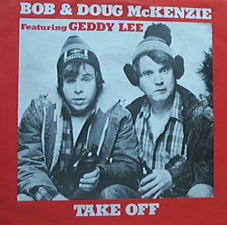
Cummings — I was a huge fan of comedy albums during the late ’70s and early ’80s, and I spent an inordinate amount of time with The Great White North … and far too much time exchanging “G’day, eh?”s with my friends and calling each other hosers. So you won’t catch me saying anything bad about “Take Off.” Actually, there’s one phrase from the album that I still use regularly — when Doug insults Bob by telling him, “You think you’re everybody.”
Smith — This song needs context, like lungs need oxygen and my liver needs prayers. You need to know what SCTV was, what kind of profile Rush had at the time, and where Canada is. It also helps to have a case of Molson Ice nearby, but then again that’s always a good thing.
Wiencek — Now THIS is my idea of a novelty song. I’m very happy the Compilers That Be chose this, because I loved it as a kid. I didn’t really get what Bob and Doug were making fun of, but they were an amiable pair of dolts and that was all I needed to know. Didn’t realize ’til years later that that high-voiced guy singing on the choruses was a well-known member of another band. If only they could have got Ann Murray on the track …
Heyliger — I don’t remember this being popular, and even now, all it elicits from me, emotion-wise, is a shrug. Not even a chortle or a chuckle. A shrug.
Boone — This is my favorite Rush song. Also, it’s the most laboratory-grade stereotypical Canadian thing ever. SCTV! Rush! Weather jokes! Legend has it that if you listen to this song three times in a row in front of a mirror, a box of Timbits will magically materialize.
Parr — Dammit, now I want some Timbits, and a large double double.
Lifton — I much prefer their version of “The Twelve Days of Christmas.”
Feerick — I’m not a McKenzie Brothers superfan or anything, but I liked their stuff back in the day. Great White North still holds up as a comedy album. I don’t know how much of it was scripted, but Moranis and Thomas had such a great chemistry that it sounds improvised. And they sound like brothers, riffing on a set of shared experiences and family in-jokes. It’s disarmingly gentle, even affectionate. And the feature film Strange Brew was a pleasure.
They retired the characters not a moment too soon, though; because the delivery is so low-key, it needs a delicate touch. ”The Twelve Days of Christmas” remains funny, because it’s unforced; but overamping the shtick — as this single does — kills the joke.





Comments